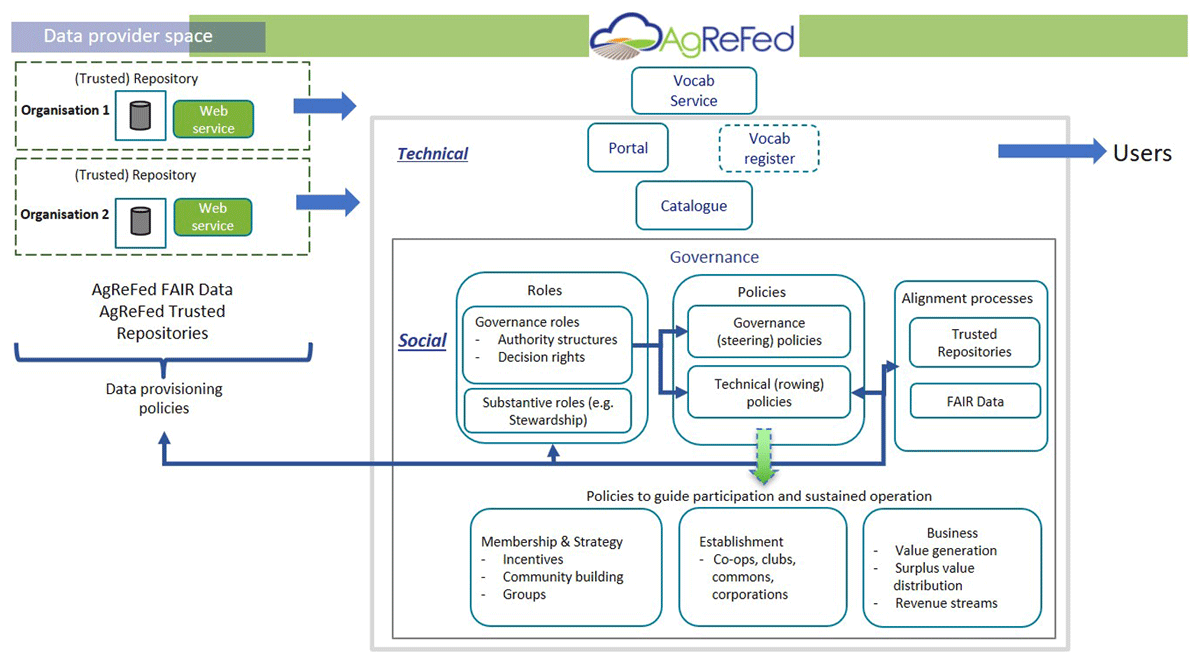Difference between revisions of "Template:Article of the week"
Shawndouglas (talk | contribs) (Updated article of the week text) |
Shawndouglas (talk | contribs) (Updated article of the week text) |
||
| Line 1: | Line 1: | ||
<div style="float: left; margin: 0.5em 0.9em 0.4em 0em;">[[File: | <div style="float: left; margin: 0.5em 0.9em 0.4em 0em;">[[File:Fig1 Wong DataSciJourn22 21-1.png|240px]]</div> | ||
'''"[[Journal: | '''"[[Journal:Development and governance of FAIR thresholds for a data federation|Development and governance of FAIR thresholds for a data federation]]"''' | ||
The [[Journal:The FAIR Guiding Principles for scientific data management and stewardship|FAIR]] (findable, accessible, interoperable, and re-usable) principles and practice recommendations provide high-level guidance and recommendations that are not research-domain specific in nature. There remains a gap in practice at the data provider and domain scientist level, demonstrating how the FAIR principles can be applied beyond a set of generalist guidelines to meet the needs of a specific domain community. We present our insights developing FAIR thresholds in a domain-specific context for self-governance by a community (in this case, agricultural research). "Minimum thresholds" for FAIR data are required to align expectations for data delivered from providers’ distributed data stores through a community-governed federation (the Agricultural Research Federation, AgReFed) ... ('''[[Journal:Development and governance of FAIR thresholds for a data federation|Full article...]]''')<br /> | |||
<br /> | <br /> | ||
''Recently featured'': | ''Recently featured'': | ||
{{flowlist | | {{flowlist | | ||
* [[Journal:Design of a data management reference architecture for sustainable agriculture|Design of a data management reference architecture for sustainable agriculture]] | |||
* [[Journal:Fueling clinical and translational research in Appalachia: Informatics platform approach|Fueling clinical and translational research in Appalachia: Informatics platform approach]] | * [[Journal:Fueling clinical and translational research in Appalachia: Informatics platform approach|Fueling clinical and translational research in Appalachia: Informatics platform approach]] | ||
* [[Journal:Using knowledge graph structures for semantic interoperability in electronic health records data exchanges|Using knowledge graph structures for semantic interoperability in electronic health records data exchanges]] | * [[Journal:Using knowledge graph structures for semantic interoperability in electronic health records data exchanges|Using knowledge graph structures for semantic interoperability in electronic health records data exchanges]] | ||
}} | }} | ||
Revision as of 17:11, 9 January 2023
"Development and governance of FAIR thresholds for a data federation"
The FAIR (findable, accessible, interoperable, and re-usable) principles and practice recommendations provide high-level guidance and recommendations that are not research-domain specific in nature. There remains a gap in practice at the data provider and domain scientist level, demonstrating how the FAIR principles can be applied beyond a set of generalist guidelines to meet the needs of a specific domain community. We present our insights developing FAIR thresholds in a domain-specific context for self-governance by a community (in this case, agricultural research). "Minimum thresholds" for FAIR data are required to align expectations for data delivered from providers’ distributed data stores through a community-governed federation (the Agricultural Research Federation, AgReFed) ... (Full article...)
Recently featured:










